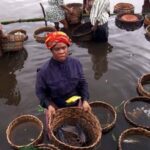

 As you approach the Lagos Free Zone (LFZ) from Eleko, off the Lekki-Epe Expressway, there are swaths of stressed green vegetation with pockets of withering grasses and palm trees. This reveals the awful truth that the environment is caving into the pressures of man’s activities that constantly impact the ecosystem.
As you approach the Lagos Free Zone (LFZ) from Eleko, off the Lekki-Epe Expressway, there are swaths of stressed green vegetation with pockets of withering grasses and palm trees. This reveals the awful truth that the environment is caving into the pressures of man’s activities that constantly impact the ecosystem.
Going further, there are several schools like the Magbon Alade Grammar School on Okolowo Bus Stop, Orimedu Secondary School, and Eagle Vicini School, among others, as well as churches like the Living Acts of the Apostles Church in Town Hall Bus Stop and further down the road, is the 49 Squadron Police Mobile Force in communities around the Ibeju-Lekki area, which also curiously lack reliable sources of clean, safe water.
This is where the Dangote Refinery is being built and if projections by its promoters are anything to go by, the facility will commence refining petroleum products before the end of 2022. Expectedly, the refinery, which has been described as the biggest in Africa and sits on 6,180 acres of land, will refine about 650, 000 barrels of crude oil per day on completion with a 4.74 billion litres storage capacity.
Financial analysts also disclosed that the construction of the refinery had overshot the initial project cost of $12 billion and had increased to about $19 billion before completion. The refinery is expected to begin production by the fourth quarter of 2022, with 75 per cent of refined products to be moved by sea within Nigeria.
But as laudable as the project seem, residents of the host communities around the Ibeju-Lekki area of Lagos State, have raised the alarm over dislocation, disruption of means of livelihoods, especially fishing, as well as the envisaged pollution that might result from possible spills on the Lagos waters during shipment, offloading and refining of crude oil.
For the locals, the issue is not how much Nigeria will benefit from the refinery, especially as the country hopes to reduce, if not totally end importation of refined petroleum products, but the fact that when completed, the project will likely displace well over 500, 000 residents and force them to leave their means of livelihoods, which is mainly fishing.
They also believe that the project will most likely pollute their environment just like exploration and refining of fossil fuels (mainly crude oil and gas flaring) in the Niger Delta pollute the region, citing increasing cases of dead fishes and dwindling catches, as well as species going into extinction.
A visit to the communities showed that residents and traditional rulers in five adjoining communities of Ibeju-Lekki believe that their relationship with the refinery would be like that of David and Goliath since the company has the backing of Lagos State and the Federal Government.
Dickson Olowookere, who confirmed that he had been living in Ibeju-Lekki for almost 25 years, lamented that like most oil-producing host communities or refineries in the Niger Delta and elsewhere, activities of the Dangote Refinery will surely alter the environment and entire ecosystem of the communities in a very significant way.
In his words: “It is a fact that the communities, management of the refinery, Lagos State and the Federal Government must brace up to because it is unavoidable. There will be accidental discharges of crude oil into the waters and there will also be incidences of mishandling of equipment, which will result in the spilling of crude oil and even refined products when the refinery fully comes on stream.
“It is, therefore, advisable for the critical stakeholders to begin to think of initiating workable ways of mitigating the impacts of such factors of pollution with a view to avoiding the kind of devastation that has been the lot of the Niger Delta region of the country. Such measures are important because like the oil-bearing states, Lagos State remains very critical to the economic survival of the country.”
An engineer, who works with Dangote Refinery, who identified himself as Michael Obinna, disclosed that even before the refinery begins refining crude oil, the fertilizer plant had started operations and that the chemical components of producing fertilizer are more dangerous than that of crude oil refining.
He explained that the pipes that will convey crude oil from the Niger Delta to the refinery from the ocean, directly overlooking the facility had since been laid and so the communities can do little or nothing to change the situation because of the vast land on which the Dangote Refinery is being built was acquired several years ago under the administration of former Governor Bola Ahmed Tinubu.
“The idea of the Dangote Refinery was first mooted to the Cross River State Government as was to have been sited in Calabar, but the financial implications and the stringent conditions the Cross River State Government gave the initiators of the project were discouraging and it had to be moved to Lagos.
“The communities should brace up for the environmental impacts the activities will cause the environment, because the truth is that refining crude oil, otherwise referred to as a dirty energy resource, must have identifiable outcomes on the environment. Refining of crude oil generates massive wastes that could have a very devastating impact on the environment, no matter how well managed.”
Civil society organisations like the Environmental Rights Action/ Friends of the Earth Nigeria (ERA/FoEN) and the Centre for Dignity had earlier raised the alarm that residents of the communities were complaining that their fishing activities were already being hampered by the construction work on the shorelines of the Atlantic Ocean where they have been fishing.
They noted that the fishermen have started noticing dead fishes on the shorelines, an indication that the operations of the refinery were already affecting marine life, a situation, they fear, will very likely worsen when actual refining activities begin fully.
A Baale said: “The management of Dangote Refinery in collaboration with the Lagos State government forcibly took over our lands without our consent. When we had a meeting with officials of Dangote Refinery, our lawyer was not allowed to attend. They said it was not time for a lawyer to be involved in the process. At the end of the meeting, there was no Memorandum of Understanding (MoU) or an agreement signed on what the company will do for us.
“We are usually given a bag of rice and a litre of vegetable oil at the end of each year. There is also a stipend of N50,000 monthly given to the Baale of each community and N30,000 to the youths and women leaders in each community. We have the poles but have no electricity in our community. We have not had electricity in the last 15 years but there is 24/4 power in the refinery because they are on Independent Power Plant (IPP). Also, our youths are unemployed. Some of the contractors ask for sex from our daughters before considering them for menial jobs.”
Also speaking, Abike Adedoye, said: “We are typically fishermen in this community. Unfortunately, since the construction work on the refinery started, we have continued to record low fish catch because the fish have retreated to safer waters. Because of this, we must go further into the Atlantic Ocean to catch anything. It is getting more dangerous to even do so because our boats can no longer withstand the strong waves of the sea.
Another respondent, Omoniyi Akinjola said: “There is no benefit of this refinery for us because the available jobs are given to strangers especially people from the Niger Delta and the east. The few of our people given jobs are given menial jobs. Most of the ladies from this community that seek jobs are given the condition of sleeping with a staff of the refinery before they get while the guys are given very menial jobs. The same practice is going on in the other companies in this community.
On his part, James Akinsolu stated: “The youth are mobilising and planning to stage a protest in the refinery with our lawyer, but the Baales are asking us not to do so. We suspect that they have been settled, but while we feel the need to go on with the planned protest, the influence they wield in the communities is so strong that they can make the communities uncomfortable and unsafe for anyone who goes against them. They can arrest any person because the police patrol the communities regularly.”
Each of the communities visited was smacked of a lack of government presence. From the poor state of the roads to the absence of drainages and the blaring noise of electric generators, nothing indicates that the communities are hosts to the multimillion-dollar refinery.
To make matters worse, whenever it rains, the roads become completely impassable due to flooding.
On the shorelines, there is heavy oil infrastructure and a perimeter fence to discourage the community people from encroaching on the facility. The high fence and other infrastructure set up to guarantee smooth operations of the refinery have ensured limited access to the sea, which the locals rely on for their livelihood.
Beyond the need for infrastructure development, residents of the communities exhibited deep-rooted anger and a foreboding that they will ultimately be dislocated from their ancestral land, just as it was also observed that there is a lack of trust for some of the community leaders, who they believe are collaborating with the refinery management and therefore, considered as traitors and ‘sell-outs.’
But in spite of the challenges, a senior official at Dangote Group, who said he was not authorised to speak on the development as it concerns the needs of the communities, said the residents have the right to be apprehensive given past experiences of host communities.
He, however, assured that the management of the company had put appropriate measures in place to mitigate any environmental impacts that might occur when the refinery commences full operations.
“By and large, the issues of lack of government presence and provision of critical infrastructure such as roads and drainages that the residents raised should be directed to the appropriate levels of government responsible for the provision of such needs.
“As for the Dangote Group, the management sought approvals from the Federal Government and the Lagos State Government at every stage of the development of the Dangote Refinery. Management also embarked on and secured the Environmental Impact Assessment (EIA) from the appropriate quarters before commencing the development of the facility.
“However, as genuine as the concerns of the communities might seem, they should direct their grievances and needs to the appropriate quarters, but they should be rest assured that the Dangote Group and management of the refinery will do all in its powers to address genuine concerns of the host communities, as part of its Corporate Social Responsibility (CSR) with a view to maintaining a cordial relationship with the host communities at all times,” he said.
To mitigate the impact on the communities, the Centre for Dignity, ERA/FoEN and other environmental activists have demanded a stoppage of the ongoing construction and other environmentally unsafe activities of the Dangote Refinery that violate the rights of the residents to a safe and conducive ecosystem.
They also asked the Lagos State and Federal Government to review the existing MoU between the management of Dangote Refinery and the Ibeju-Lekki communities to ensure that the genuine concerns of the communities are addressed.
Other demands include that the Lagos State Government should ensure the communities are provided basic amenities including electricity, potable water and good roads to make life more meaningful and enjoyable for the locals, while the youths should be meaningfully employed.
The Dangote Refinery should make public the Environmental and Social Impact Assessment (ESIA) conducted before construction began on the project, while the communities should be allowed to engage the services of human rights lawyers in their dealings with the management of the company.
 The New Experience Newspapers Online News Indepth, Analysis and More
The New Experience Newspapers Online News Indepth, Analysis and More
